Personalities
 |
 |
 |
 |
 |
 |
 |
King Ferdinand III & the Siege of Seville - II
Moslem Seville Surrenders to King Ferdinand
The siege reached a critical stage during the summer of 1248 when famine, disease and terrible heat brought unbearable suffering to both sides. The firm and confident leadership of King Ferdinand III of Castile and Léon and the fortitude and determination of his men gave the advantage to the Catholics.
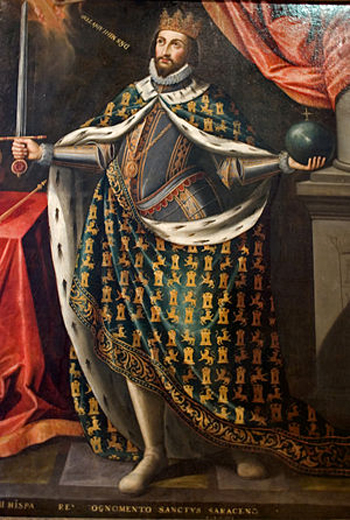 Finally, after a particularly embarrassing defeat, Moorish ambassadors arrived carrying a flag of truce at the Castilian camp, asking to see Don Ferdinand. Thanking God because it was the beginning of the end, the King watched them approach and gave them permission to return with a larger delegation from Seville to make a full surrender.
Finally, after a particularly embarrassing defeat, Moorish ambassadors arrived carrying a flag of truce at the Castilian camp, asking to see Don Ferdinand. Thanking God because it was the beginning of the end, the King watched them approach and gave them permission to return with a larger delegation from Seville to make a full surrender.
A few hours later, that delegation arrived and reported to Rodrigo Alvarez, the son of the famed warrior Alvar Pérez. In turn, Don Rodrigo, who was fluent in the Moorish language, went to the King, bringing the conditions they were offering for the surrender: to declare themselves vassals of King Don Ferdinand, to deliver the alcazar to him, and to pay him the taxes they had paid the miramolin.
But Ferdinand did not even want to listen. He told Rodrigo not to give them the least hope of reaching a settlement or even of seeing him until they surrendered.
A second time the Moors came, offering in addition to what had been previously proposed the third part of the city. This time also the King inexorably refused.
They then came a third time, now offering half of the city and promising to build a wall to separate it. But the King sent them a message that he would accept no other conditions but a total surrender of the whole city, completely evacuated. If they did not agree to this, they would suffer all the rigors of an unconditional surrender with all of its consequences.
Some of the nobles, already tired, wished to accept the latest terms, that the King insisted that they must persevere to the end. He reminded them that whoever is in such an extreme situation as were the people of Seville are not in the position to impose conditions. To Fr. Remondo, his confessor, he remarked that God's promised victories are not half-victories.
The Moors had no choice but accept the iron will of that King Ferdinand, who, like a curse of Allah, crossed Andalusia exterminating Islam. The ambassadors returned with broader powers to act and, then, Don Ferdinand received them.
Total surrender is given amid tears
After they had been conducted to his tent, they found him waiting surrounded by his whole cortege. The King was wearing his mail coat, broken and mended, and his well-darned coat of arms, as he said, “It is not right for a king to dress poorly unless it is a consequence of combat against his enemies.”
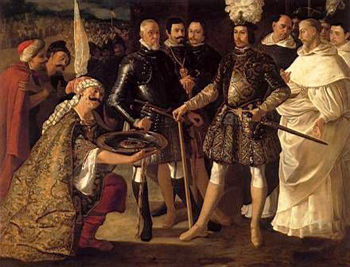 He had such an air of serene majesty that, in spite of being dressed like his nobles, the Moors had no trouble in recognizing him as the King. At his right hand was his son Alfonso, who was then a young man of 27 years, and at his left, his brother Don Alfonso de Molina. On both sides were the prelates and the noblemen; at one side of the table acting as notary was Don Remondo. Rodrigo Alvarez de Castro stood behind the King and his son to interpret.
He had such an air of serene majesty that, in spite of being dressed like his nobles, the Moors had no trouble in recognizing him as the King. At his right hand was his son Alfonso, who was then a young man of 27 years, and at his left, his brother Don Alfonso de Molina. On both sides were the prelates and the noblemen; at one side of the table acting as notary was Don Remondo. Rodrigo Alvarez de Castro stood behind the King and his son to interpret.
Wrapped in white mantles with their heads covered with turbans, the Mohammedans entered and, touching their foreheads with their hands, they made a profound reverence to King Ferdinand. After having obtained license to speak, their chief began:
“King Ferdinand, as it is written that Seville shall be yours, we give it to you with the power the Wali has invested in us for this purpose. As you see us in submission, have mercy on us.” The King remained silent for a few moments. What could he say? The humility of the vanquished infidels disarmed the heart of the conqueror. When he saw that they placed themselves in submission, he politely answered:
“As you give me the city and place yourselves in my hands, I will let you go free and exempt your wives and children and all the belongings you can take with you. Starting today, I will give you one month to leave, but you must leave the Alcázar immediately.”
Since the sentence of leaving the precious city of their ancestors was irrevocable, Don Ferdinand was treating them with much tenderness. The sad, vanquished men realized this. In spite of this, when they heard the judgment, their grief was so great that they bowed their heads in silence and cried.
The Castilians also remained silent since it is not proper for noble souls to rejoice in the sufferings of the defeated. The compassion that Don Ferdinand felt for the unfortunate ones was visible in his eyes.
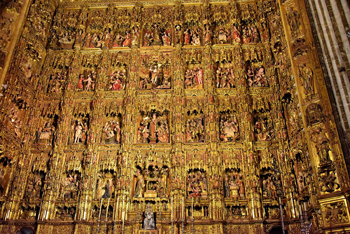 All remained silent. Then, King Ferdinand, with a serious and dignified politeness that imposed conditions painlessly continued: “Tell the Wali Axataf that I give him and the captain the cities of Abenxuef, Sanlúcar and Aznalfarache. And also Niebla after the Lord gives it to me. Do you agree and are you ready to sign?”
All remained silent. Then, King Ferdinand, with a serious and dignified politeness that imposed conditions painlessly continued: “Tell the Wali Axataf that I give him and the captain the cities of Abenxuef, Sanlúcar and Aznalfarache. And also Niebla after the Lord gives it to me. Do you agree and are you ready to sign?”
The King had spoken Castilian throughout the whole conference, so that all his counselors could understand, charging Rodrigo Alvarez with translating his words into Arabic. The delegation from Seville indicated their agreement with all the terms and, then, Don Remondo presented the document to be signed. The Moors approached and signed, one after the other, with more tears than if it were their death sentence.
As they were leaving, Ferdinand said again to them: “My ships are willing to take to Africa those who wish to go. I will also order my knights to accompany those who want to live in Granada and to guard and defend them on their way.”
“We appreciate this very much, Lord,” the chief negotiator answered. Making a profound reverence, they left. The King said to his Chamberlain Rodrigo González Girón: “Go with them and take the Alcázar on my behalf and place the Holy Cross and my standard on it.”
To view this placement, Ferdinand crossed the river with his men since it would not be visible from the camp site. As they arrived, the silver Cross that the King had received from the Bishop around two years before appeared for the first time on the tower of the Alcázar. This was a very solemn moment in his life. Seeing the Cross there crowned the mission that, in the name of God, St. Isidore had given him.
He shed tears of consolation, and all of his soldiers, watching it shine like a diamond in the noon sun, shouted praise to God who helps those who fight for Him.
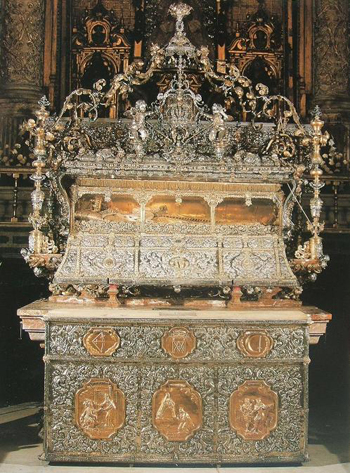 Afterward, Ferdinand returned to his camp to await the delivery of the keys that the unfortunate Axataf would make. His wait was quite short.
Afterward, Ferdinand returned to his camp to await the delivery of the keys that the unfortunate Axataf would make. His wait was quite short.
Axataf presented himself in the King’s tent accompanied by a few Moors. Approaching the King, he delivered the keys to him. “Take them, King Ferdinand,” he said as he placed them in his hands. “It was written that Seville would be yours. I greatly appreciate that you want to give me Sanlúcar and Aznalfarache, but I do not accept them. I can better help those of my race in Africa in their fight with the Benimerines.”
“Do as you please, Axataf,” answered Ferdinand. “I was giving them to you willingly. But if you do not want them, may God be with you and favor you.”
“Farewell, King Ferdinand, may Allah guard you.”
He went out. Ferdinand accompanied him as far as the tent’s door and from there watched him go to the river and embark on a little ship for Cádiz. ...
It was November 23, the feast of St. Clement, in the year of Christ 1248.
The entry into Seville
The King chose December 22, the feast of St. Isidore for his solemn entrance. Ferdinand himself organized the ceremonies of the solemn entrance. Under a splendid dome, appearing among flowers and candles burning on a silver candelabra was the image of the Virgin of the Kings and her Divine Infant. At the right and left of her, Don Ferdinand and Dona Joanna rode on horseback.
He was wearing his armor, and over it, his coat of arms, in white silk embroidered in gold and blue. In place of a helmet he wore the royal crown, and in his hand, shining unsheathed in the rising sun rays, he held his formidable sword, "my sword Lobera," as he called it, so loved and venerated by him as an object favored by God with special blessings.
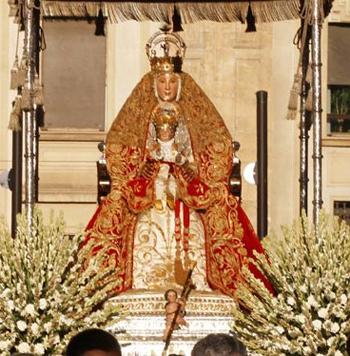 The religious-military procession – composed of long lines of clergymen and warriors – entered the city through the door of Goles and went to the principal mosque. There the Bishop of Córdoba came out to receive Our Lady amid songs and prayers to welcome her into what would be her royal mansion. After the Mass, they processed to the alcazar, the marvelous palace surrounded with dreamlike gardens.
The religious-military procession – composed of long lines of clergymen and warriors – entered the city through the door of Goles and went to the principal mosque. There the Bishop of Córdoba came out to receive Our Lady amid songs and prayers to welcome her into what would be her royal mansion. After the Mass, they processed to the alcazar, the marvelous palace surrounded with dreamlike gardens.
Uberto, Pope Innocent III's nephew, was present at the triumph, suitably impressed by so much magnificence. Considering the wonderful fortune of that King who never went into a battle he did not win or besiege a city that did not fall into his hands, Uberto asked him: "Lord, why is it that you are always victorious, something that cannot be said of any other king?"
Ferdinand answered him simply: "Perhaps the others had different motives such as the goal of enlarging their kingdoms." He continued, lifting his eyes, "Thou, O Lord, Who seest my heart as you see the heart of each man, know that I do not seek my honor but Thine, not the greatness of a perishable reign but the Kingship of Christ on earth."
To be continued
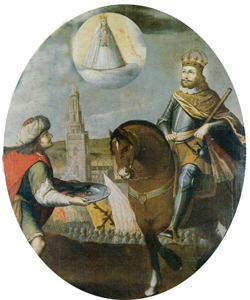

Adapted from M.C. Fernandez de Castro ACJ,
The Life of the Very Noble King of Castile and Léon, Saint Ferdinand III
NY: The Foundation for a Christian Civilization, Inc. 1987, pp. 252-259
Posted December 10, 2018

King Ferdinand II with his famed sword Lobera
A few hours later, that delegation arrived and reported to Rodrigo Alvarez, the son of the famed warrior Alvar Pérez. In turn, Don Rodrigo, who was fluent in the Moorish language, went to the King, bringing the conditions they were offering for the surrender: to declare themselves vassals of King Don Ferdinand, to deliver the alcazar to him, and to pay him the taxes they had paid the miramolin.
But Ferdinand did not even want to listen. He told Rodrigo not to give them the least hope of reaching a settlement or even of seeing him until they surrendered.
A second time the Moors came, offering in addition to what had been previously proposed the third part of the city. This time also the King inexorably refused.
They then came a third time, now offering half of the city and promising to build a wall to separate it. But the King sent them a message that he would accept no other conditions but a total surrender of the whole city, completely evacuated. If they did not agree to this, they would suffer all the rigors of an unconditional surrender with all of its consequences.
Some of the nobles, already tired, wished to accept the latest terms, that the King insisted that they must persevere to the end. He reminded them that whoever is in such an extreme situation as were the people of Seville are not in the position to impose conditions. To Fr. Remondo, his confessor, he remarked that God's promised victories are not half-victories.
The Moors had no choice but accept the iron will of that King Ferdinand, who, like a curse of Allah, crossed Andalusia exterminating Islam. The ambassadors returned with broader powers to act and, then, Don Ferdinand received them.
Total surrender is given amid tears
After they had been conducted to his tent, they found him waiting surrounded by his whole cortege. The King was wearing his mail coat, broken and mended, and his well-darned coat of arms, as he said, “It is not right for a king to dress poorly unless it is a consequence of combat against his enemies.”

The keys of Seville delivered to the victorious King
Wrapped in white mantles with their heads covered with turbans, the Mohammedans entered and, touching their foreheads with their hands, they made a profound reverence to King Ferdinand. After having obtained license to speak, their chief began:
“King Ferdinand, as it is written that Seville shall be yours, we give it to you with the power the Wali has invested in us for this purpose. As you see us in submission, have mercy on us.” The King remained silent for a few moments. What could he say? The humility of the vanquished infidels disarmed the heart of the conqueror. When he saw that they placed themselves in submission, he politely answered:
“As you give me the city and place yourselves in my hands, I will let you go free and exempt your wives and children and all the belongings you can take with you. Starting today, I will give you one month to leave, but you must leave the Alcázar immediately.”
Since the sentence of leaving the precious city of their ancestors was irrevocable, Don Ferdinand was treating them with much tenderness. The sad, vanquished men realized this. In spite of this, when they heard the judgment, their grief was so great that they bowed their heads in silence and cried.
The Castilians also remained silent since it is not proper for noble souls to rejoice in the sufferings of the defeated. The compassion that Don Ferdinand felt for the unfortunate ones was visible in his eyes.

The magnificent main altar of the Cathedral of Seville
The King had spoken Castilian throughout the whole conference, so that all his counselors could understand, charging Rodrigo Alvarez with translating his words into Arabic. The delegation from Seville indicated their agreement with all the terms and, then, Don Remondo presented the document to be signed. The Moors approached and signed, one after the other, with more tears than if it were their death sentence.
As they were leaving, Ferdinand said again to them: “My ships are willing to take to Africa those who wish to go. I will also order my knights to accompany those who want to live in Granada and to guard and defend them on their way.”
“We appreciate this very much, Lord,” the chief negotiator answered. Making a profound reverence, they left. The King said to his Chamberlain Rodrigo González Girón: “Go with them and take the Alcázar on my behalf and place the Holy Cross and my standard on it.”
To view this placement, Ferdinand crossed the river with his men since it would not be visible from the camp site. As they arrived, the silver Cross that the King had received from the Bishop around two years before appeared for the first time on the tower of the Alcázar. This was a very solemn moment in his life. Seeing the Cross there crowned the mission that, in the name of God, St. Isidore had given him.
He shed tears of consolation, and all of his soldiers, watching it shine like a diamond in the noon sun, shouted praise to God who helps those who fight for Him.

The incorrupt body of St. Ferdinand in the Altar of the Kings in the Seville Cathedral
Axataf presented himself in the King’s tent accompanied by a few Moors. Approaching the King, he delivered the keys to him. “Take them, King Ferdinand,” he said as he placed them in his hands. “It was written that Seville would be yours. I greatly appreciate that you want to give me Sanlúcar and Aznalfarache, but I do not accept them. I can better help those of my race in Africa in their fight with the Benimerines.”
“Do as you please, Axataf,” answered Ferdinand. “I was giving them to you willingly. But if you do not want them, may God be with you and favor you.”
“Farewell, King Ferdinand, may Allah guard you.”
He went out. Ferdinand accompanied him as far as the tent’s door and from there watched him go to the river and embark on a little ship for Cádiz. ...
It was November 23, the feast of St. Clement, in the year of Christ 1248.
The entry into Seville
The King chose December 22, the feast of St. Isidore for his solemn entrance. Ferdinand himself organized the ceremonies of the solemn entrance. Under a splendid dome, appearing among flowers and candles burning on a silver candelabra was the image of the Virgin of the Kings and her Divine Infant. At the right and left of her, Don Ferdinand and Dona Joanna rode on horseback.
He was wearing his armor, and over it, his coat of arms, in white silk embroidered in gold and blue. In place of a helmet he wore the royal crown, and in his hand, shining unsheathed in the rising sun rays, he held his formidable sword, "my sword Lobera," as he called it, so loved and venerated by him as an object favored by God with special blessings.

Every year the Virgin of the Kings is processed through the streets of Seville
Uberto, Pope Innocent III's nephew, was present at the triumph, suitably impressed by so much magnificence. Considering the wonderful fortune of that King who never went into a battle he did not win or besiege a city that did not fall into his hands, Uberto asked him: "Lord, why is it that you are always victorious, something that cannot be said of any other king?"
Ferdinand answered him simply: "Perhaps the others had different motives such as the goal of enlarging their kingdoms." He continued, lifting his eyes, "Thou, O Lord, Who seest my heart as you see the heart of each man, know that I do not seek my honor but Thine, not the greatness of a perishable reign but the Kingship of Christ on earth."
To be continued


Adapted from M.C. Fernandez de Castro ACJ,
The Life of the Very Noble King of Castile and Léon, Saint Ferdinand III
NY: The Foundation for a Christian Civilization, Inc. 1987, pp. 252-259
Posted December 10, 2018
______________________
______________________
 Volume I |
 Volume II |
 Volume III |
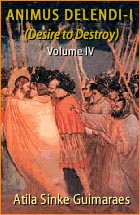 Volume IV |
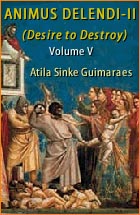 Volume V |
 Volume VI |
 Volume VII |
 Volume VIII |
 Volume IX |
 Volume X |
 Volume XI |
 Special Edition |


